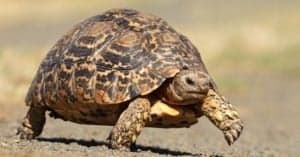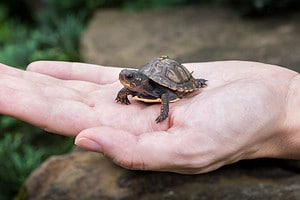Famous for their speed, or lack of it, tortoises are reptiles with shells that they are born with. These shells are attached to the tortoise’s skeleton with more than 50 bones, making it impossible to detach. So, it’s not possible to take off a tortoise’s shell- if you’ve ever wondered.
These slow creatures are mild-mannered and terrestrial creatures that cannot live in water- unlike their turtle relatives. However, despite their unique features, tortoises are normal living organisms that excrete waste. Here is everything you’ve ever wanted to know about tortoise poop.
Tortoises: The Slow, Shelled Reptiles
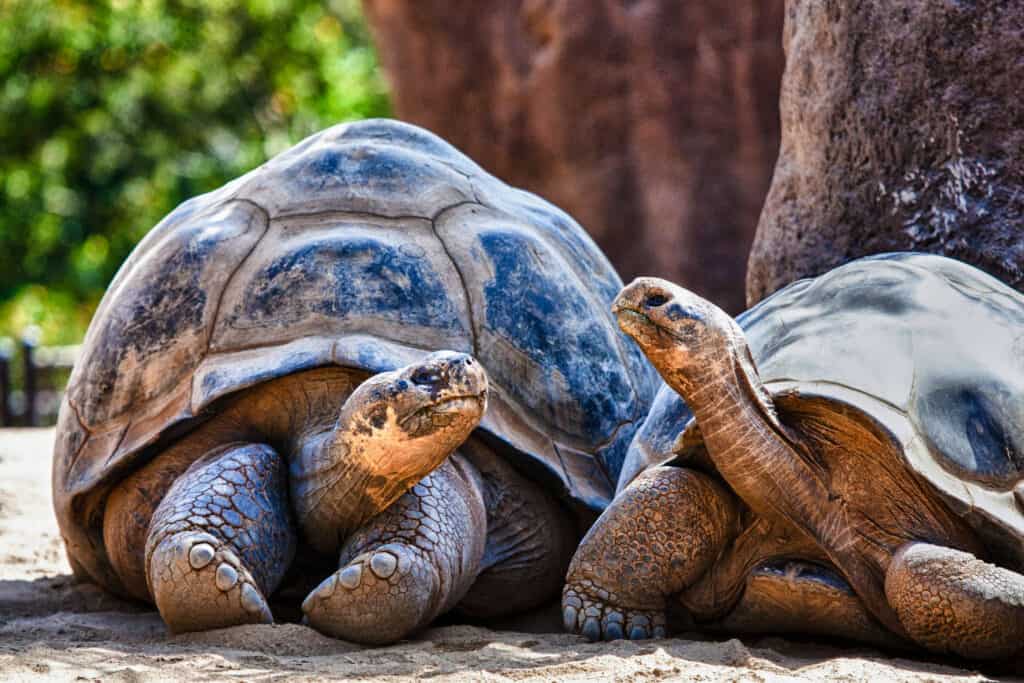
Tortoises can live up to 6 months without a brain.
©iStock.com/paulacobleigh
Scientists believe that tortoises were in existence as far back as 250 million years ago, which is impressive, considering that dinosaurs first appeared about 252 million years ago. Perhaps slow and steady does win the race; tortoises have outlived the much faster and bigger dinosaurs for more than 65 million years with no end in sight.
Tortoises have really small brains, and as a 17th-century experiment proved, they can live up to 6 months without a brain. They can also live for up to 23 days without a head. However, their small brain isn’t what scientists attribute to their speed. As smaller tortoises prove, the species move slowly due to their size. Heavy adult tortoises move a lot slower than juvenile tortoises. Another reason for their slow speed is their slow metabolism which doesn’t allow them enough energy to put up with their mass.
Tortoises come in a range of sizes, from tiny to large. The smallest tortoise species is the speckled tortoise which hardly grows past 3 inches long and weighs a maximum of 5.8 ounces (164 grams). The largest tortoise species is the Galápagos tortoise, which can weigh more than 500 pounds and grow up to 6 feet long.
What Do Tortoises Eat?
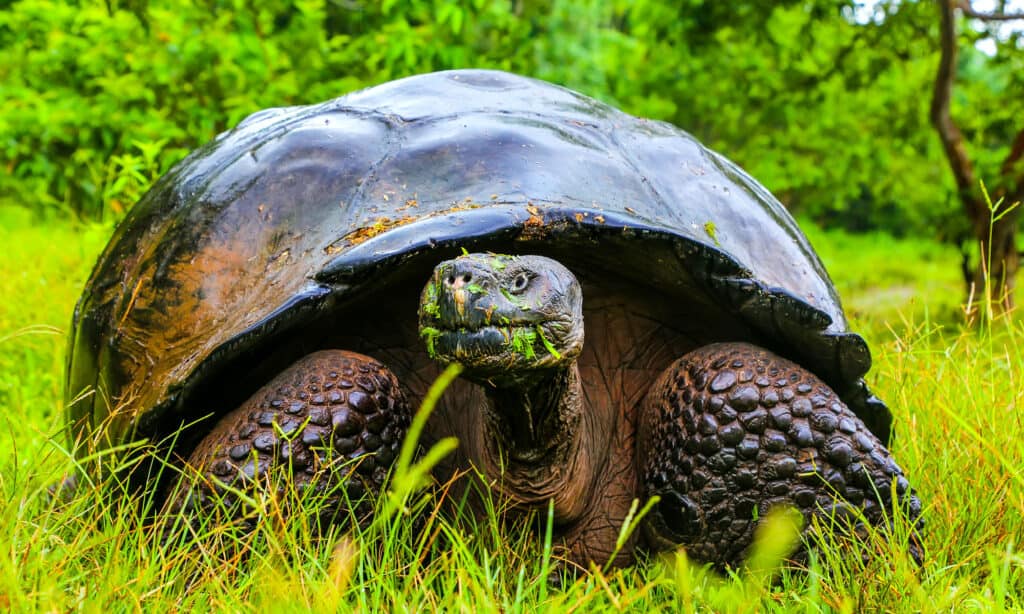
Most tortoises are true omnivores that generally only eat greens.
©iStock.com/Donyanedomam
Tortoises are true omnivores that generally only eat greens. A tortoise will happily eat grass, fruits, flowers, and weeds. A few tortoise species eat worms in their natural habitats. However, too much protein is bad for these animals.
Despite their size and speed, tortoises have great eyesight, unlike most reptiles, such as snakes. Tortoises see really well and can even pick out colors that often attract them. This allows them to spot food easily when in the wild. Some people also claim that tortoises have a great sense of smell, but since it hasn’t been proven, it is a source of contention.
What Does Tortoise Poop Look Like?
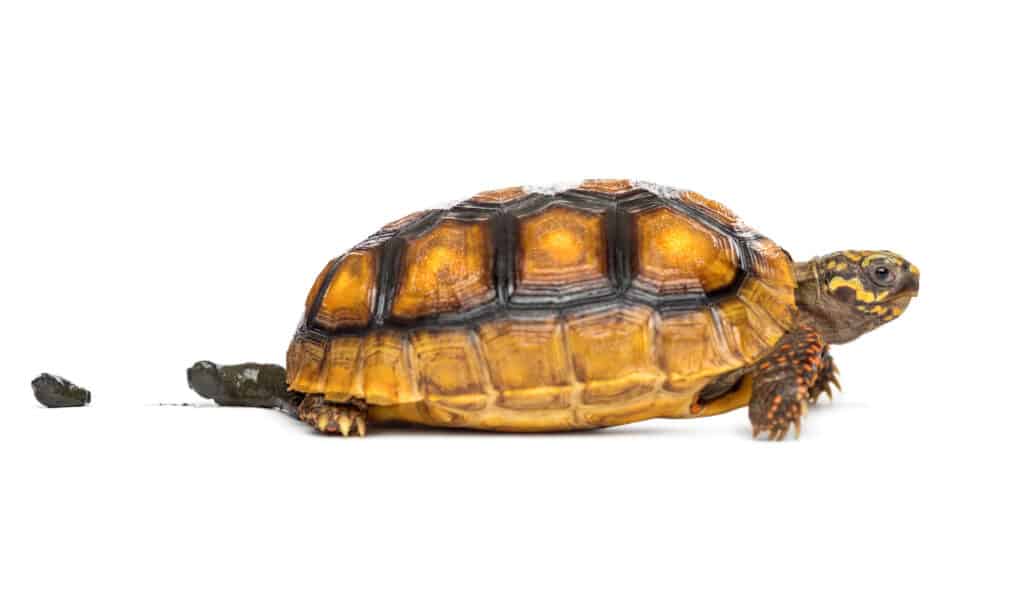
Tortoise poop is solid and firm, and usually colored brown to greenish-brown.
©iStock.com/GlobalP
Tortoise poop is usually colored brown to greenish-brown. Usually, their poop is solid and firm, except they eat something they shouldn’t. They also have three types of excreta; poop, urine, and another called urates.
As we’ve mentioned, too much protein can be dangerous for these animals. When their bodies process food, protein is processed separately and is stored in the urinary bladder. When this matter, called urates, is passed out, it is often a creamy white color. Urates may often be passed as the tortoise urinates.
Do Tortoises Eat Their Own Poop?
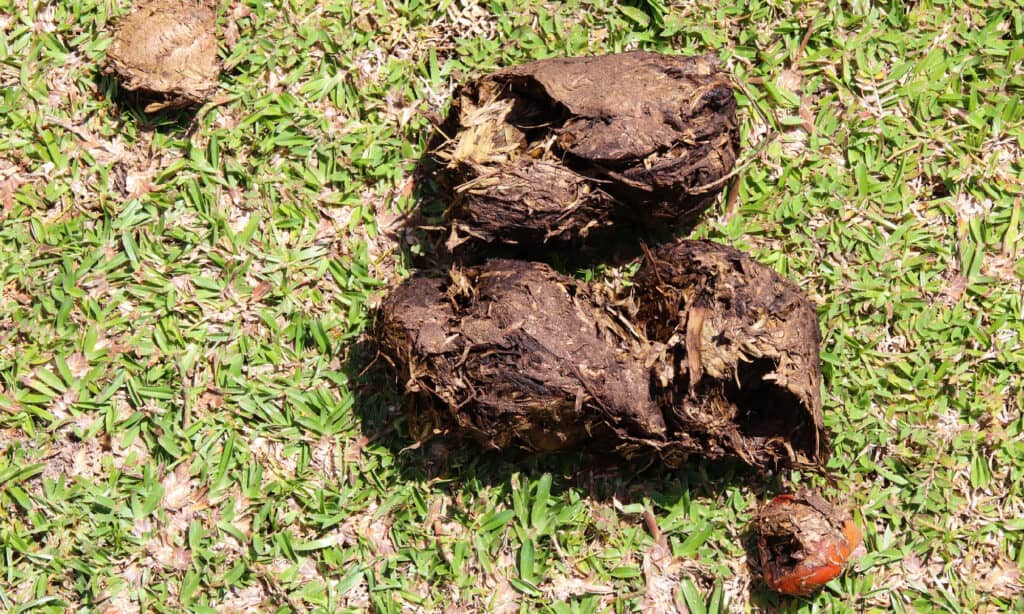
Tortoises may eat their own poop.
©iStock.com/Africanway
Tortoises may eat their own poop. However, many animals also do, and it isn’t anything to be concerned about. This is usually done to re-digest missed minerals. If you are caring for a tortoise, cleaning it daily could prevent this from happening. This can also help to ensure that there are no unwanted smells. Tortoise poop doesn’t smell strongly, but it does smell, and the odor is unpleasant.
Is Tortoise Poop Toxic To Humans?
Tortoise poop may be infected with Salmonella. When handling any fecal matter from tortoises, be sure to slip a pair of disposable gloves on, and properly wash your hands afterward.
Do Tortoises Eat Other Animals Poop?
A tortoise could eat another animal’s poop if it is starving or lacking nutrients. Normally, they prefer leafy greens but will revert to eating poop as a survival mechanism if they are malnourished.
Is Tortoise Poop A Good Fertilizer?
Tortoise poop is an excellent natural fertilizer, especially because of its plant-based diet. However, it requires careful handling as tortoises are carriers of salmonella.
3 Unique Facts About Tortoises
1. Tortoises are reptiles of the Testudinidae family
Tortoises are reptiles of the Testudinidae family. Animals in this family are reptiles with a shell that grows from or is attached to their ribs. Tortoise shells are mostly made of bones, with the carapace at the top and the plastron at the bottom. The top part is covered with scutes which are made of keratin, like human nails.
2. The tortoise’s major defense is its shell
Snakes, foxes, coyotes, and other large cats often make a meal of tortoises. However, tortoises have a number of defenses to help keep them safe, the chief of which is their hard shell. Another defense is their gular horns which they mainly use when fighting other tortoises.
They use their horns to turn or flip their opponents on their backs, making them extremely vulnerable. Tortoises also have strong claws and sharp beak-like mouths, which they snap at smaller predators to warn them away.
3. Tortoises are calm and docile animals
Tortoises are calm and docile, even displaying shyness. However, these animals can recognize their owners and even show affection. Tortoises are often kept as pets and can be a great choice if you’re on the lookout for a pet that could outlive you and require a moderate level of care.
Up Next:
10 Incredible Galapagos Tortoise Facts
Snapping Turtle vs. Tortoise: Key Differences
The photo featured at the top of this post is © Joseph Alexander Cruz/Shutterstock.com
Sources
- https://tortoise-tracks.org/lifecycle-of-the-desert-tortoise/, Available here: https://tortoise-tracks.org/lifecycle-of-the-desert-tortoise/
- Google Books, Available here: https://books.google.com.ng/books?id=_n1IAAAAMAAJ&pg=PA54#v=onepage&q&f=false
Thank you for reading! Have some feedback for us? Contact the AZ Animals editorial team.




